Statement by Mr. Felix Schnyder, United Nations High Commissioner for Refugees, to the 36th Session of the United Nations Economic and Social Council (ECOSOC), 1 May 1963
The Council has before it the annual report (E/3777) which I am submitting to it as usual before presenting it to the General Assembly.
You will, I am sure, allow me to recall, in introducing this report, that last year the Assembly decided by an almost unanimous vote to extend the mandate of the Office of the High Commissioner until 31 December 1968. A new phase is thus opening in the humanitarian activities of the Office, and I should like to outline briefly their present nature and likely future development.
An important page is at this moment being turned in the history of the High Commissioner's Office. The completion of the large-scale programmes for the benefit of European refugees who had suffered as a result of the second world war constitutes a decisive stage in the work accomplished since the office was set up in 1951. Owing to present circumstances, however, the focal points at which most new refugee problems occur have shifted from Europe to other contents, particularly Africa. The High Commissioner's Office has had to give immediate attention to the new tasks which have arisen there. It has been expressly requested to do so in several resolutions by the General Assembly, and has been spurred on by events themselves.
What, then, is the present position of the High Commissioner's Office? How is this transfer of its activities, enforced by the needs of the moment, being effected? These are the questions which I should like to answer briefly.
In considering the activities of the High Commissioner's Office it is, I believe, essential to distinguish between those involving international protection, and the more concrete effort to stimulate, by a limited but adequate assistance programme, the quest for permanent solutions. These activities are, it is true, closely related, but they nevertheless differ in their nature. "Protection" deals with a legal problem linked with the very concept of "refugee", the existence of persons for whom a special status has had to be create by an act of the international community, which has then called upon the High Commissioner's Office to safeguard that status. It is characterized on the one side by its continuity and its duration, which usually goes hand in hand with the very existence of refugees as defined in the mandate, and on the other side by a certain unity, an identity of means and objectives, irrespective of the country in which it is exercised.
Nevertheless, protection is in no way intended to perpetuate the problem. Its ultimate objectives are, therefore, either voluntary repatriation, or acquisition by the refugee, if he so desires, of a new nationality; either solution satisfactorily ends his refugee status.
The second aspect of the duties of the High Commissioner's Office is to put permanent solutions into effect through economic measures. This task is stimulated by the complementary assistance programme of the High Commissioner's Office; its object is to settle permanently certain specific problems which can only be solved by temporary material assistance. The amount and conditions of this assistance are closely related to the magnitude and nature of the needs and to the relative ability of the receiving countries to meet them from their own resources. Lastly, assistance to refugees relies not only on the sympathy and the humanitarian sentiments of the receiving countries, as in the case of protection of refugees, but also on a more direct and concrete effort of international solidarity, of which it is itself an expression.
The past year has been a highly satisfactory one for the international protection of refugees. Eight more States, including several African States, have ratified the Convention of 28 July 1951, on which protection is largely based. The growing number of countries which have ratified the Convention - 42 at present - with those which, without formally acceding to this legal instrument, nevertheless apply its principles, eloquently expresses the widening recognition of the concept and the rights of the refugee.
Other important progress has also been made in this sphere, both through measures to facilitate the movement of refugees between different countries, and through improvements in their social status made either by extending to them the principle of equality with nationals or by entitling them to specific benefits under regional or bilateral agreements.
I should also like to recall that the General Assembly began last year to discuss a draft declaration on the right of asylum. The High Commissioner's Office has naturally followed the debate on this mater with the greatest interest. It is bound to welcome every instrument which in any way confirms or sanctions the effect already given to the right of asylum in many countries. It need hardly be stressed that the right of asylum is the very basis and prerequisite for all other rights which may subsequently be granted to refugees.
Implementation of the agreement concluded with the Federal German authorities concerning assistance to refugees who suffered from Nazi persecution, has continued and has now reached a considerably more advanced stage. In this connection I should like to mention that my Office has meanwhile pursued discussions with the Federal German authorities for an improvement in the position of refugees under German law. Provisions to this effect have been incorporated in a bill which the Federal Cabinet has recently submitted to Parliament for approval. It is therefore to be hoped that certain groups of refugees who have hitherto been excluded from benefit under the indemnification laws will in future receive compensation for the persecution they have suffered.
Protection, however, though the essence of a complex and continues action, is not sufficient by itself. Experience has shown that it would very frequently remain ineffectual and would fail to achieve its purpose unless combined with an effort by the international community to lighten the burden constituted by refugees where it would be too heavy for the receiving countries' resources.
Appreciation of the fact inspired the great undertaking, now nearing completion, that was launched to relieve the accumulated misery of many years, of which the multiplication of refugee camps was but one of the most striking and harrowing symptoms. The concerted action undertaken for this purpose by the international community through the High Commissioner's Office is now bearing fruit. I will merely mention some recent figures. About 12,000 refugees were resettled last year under the programme of the High Commissioner's Office, apart from those who succeeded in emigrating or settling locally without any assistance. The camp clearance programme is continuing at a satisfactory rate; since, despite the growing difficulties due to the very nature of the residual cases with which we are increasingly concerned, 3,300 of those were settled during this improved; they have admittedly been much helped by the favourable economic conditions at present prevailing in Europe.
The position at the beginning of the current year was therefore as follows: 38,500 "old" refugees, including 4,100 in camps, still remained to be settled. We expected about one-third of these to be absorbed into the expanding economy, while the necessary funds were made available under the last of our major programmes for the resettlement of the other two-thirds, consisting mostly of handicapped refugees. The settlement of the approximately 6,500 non-settled refugees who arrived after 31 December 1960, the final date for inclusion in that programme, will, where necessary, be helped by the present complementary assistance programme which I shall discuss in a moment.
I have just spoken of the handicapped refugees. I should now like to refer briefly to paragraph 42 of the report, which mentions the methodical survey undertaken at our request by Dr. Jensen among 850 refugees selected from the most seriously handicapped and whom it has so far been impossible to resettle in accordance with their desire. As a result of this detailed psycho-social evaluation, more than 300 of these persons had by a recent date been resettled. A few days ago I was advised by the Australian Government of its intention to receive in the near future an estimated one-third of the 100 cases submitted to it - approximately one hundred persons. These refugees will enjoy the various facilities extended to immigrants arriving under Government programmes.
I need hardly say how delighted I am at a decision which, with these already taken by several other countries, encourages the hope that all handicapped persons for whom a suitable solution can be found will henceforth stand a real chance of escaping the wretched fate which appeared to await them.
We have therefore good grounds for believing that, thanks to the sympathetic attitude of governments, the programme approved last year by the Executive Committee will be fully implemented. This, it will be remembered, is a programme of $6,800,000 of which $5,400,000 is reserved for "old" European refugees. Allowing for the time needed to execute it, the end of next year, or at latest the beginning of 1965, should see the completion of an undertaking which has engaged for very many years the attention of the High Commissioner's Office and the goodwill of many governments. These will then have the satisfaction of witnessing the triumphant fulfilment of their efforts, the full significance of which will then become apparent; they will at the same time see the disappearance of a wound both hideous and anachronistic in a continent enjoying full economic and social development.
With the mortgage of the past thus redeemed, assistance to European refugees will quite naturally assume a pattern and preparations corresponding to the current aspects of a problem which, still reflecting the events which followed the last war, does not call for a shock treatment similar to that which has to be devised to relieve a misery too long ignored.
The day-to-day action new necessary to forestall any fresh accumulation of destitute refugees has for the first time been incorporated in the part of the 1963 programme devoted to complementary assistance. This action is indeed complementary and marginal, since the leading part in it must be played by the governments concerned, which, with the assistance available from the voluntary agencies, have to meet the generally heavy financial burden of receiving and resettling the refugees to whom they grant asylum, without regard to age or to physical or professional ability. The programme of the High Commissioner's Office represents, indeed, no more than the starting-point of the much greater effort that has to be undertaken in each of the countries to which it extends its aid, the main purpose of this aid being to create the necessary technical, financial and psychological conditions for the more extensive assistance the receiving countries are expected to provide. To the work of the High Commissioner's Office should also be added the large-scale and continuing activities of the voluntary agencies. To understand the importance of the role played by these agencies it will suffice to recall the variety of forms which these activities have taken ever many years, wherever they are carried out - long or short-term material assistance, search for employment, adequate housing, and all kinds of advice and support. I would, therefore, like to take this opportunity to pay to the agencies the tribute they deserve for the magnificent effort which they unceasingly display throughout the world, and which is matched by the generous response they succeed in arousing on the part of a public which is becoming every day more familiar with the problems of refugees.
The results recorded after the first complementary assistance programme for European refugees had been in operation for several months prove beyond doubt that we are on the right road. They also indicate, however, that below a certain level assistance loses all effect and consequently all meaning. For this reasons the sums allotted for complementary assistance under a budget most of which has been earmarked for settlement of the old problems will have very soon to be reviewed, when the 1964 budget is drawn up, in the light of the experience acquired in 1963.
As well as carrying out these traditional tasks, the High Commissioner's Office is now, as I have already said, engaged in a new undertaking which has called for a special effort of adaptation. Far from the theatres of operation with which it was familiar, new refugee problems have arisen to which it must devote a large part of its activities.
One of the principal characteristics of these new problems, at any rate for the present, is that they call for material assistance rather then legal protection. In view of the traditions of hospitality and the extensive settlement facilities latent in most of the countries in which refugees seek asylum, the most immediate need is for material assistance to ensure first their survival and later their integration by a plan and methods which must be kept as simple and effective as possible. The initial obstacles to be overcome are therefore practical rather than legal, and relate in particular to temporary housing, distribution of food, cultivation of virgin land, and supply to the refugees of the necessary equipment and seeds, in regions where communications are scanty and frequently hampered by climate.
Our objective has nevertheless always been to enable the refugees to become self-supporting as early as possible, by making maximum use of the assistance available locally or obtainable from elsewhere, and thus reducing the financial assistance provided by the High Commissioner's Office to a strict minimum.
Before turning to other problems which are to-day more immediately urgent for the High Commissioner's Office, I should like to mention briefly that, although the repatriation of Algerian refugees has, as you know, in general been satisfactorily completed, with the active assistance of the High Commissioner's Office, the Office has remained in contact with the Algerian authorities in order to decide what use should, in pursuance of General Assembly resolution 1672 (XVI), be made of the funds placed at its disposal for the completion of the temporary task entrusted to it by this resolution. I should like to stress in this connection that, though the action by the High Commissioner's Office has now entered its final stage, the same cannot be said of the assistance to the needy Algerian populations, to which the voluntary agencies as well as other national and international bodies continue to make an active contribution.
For the Togo refugees, it has likewise proved possible to complete the resettlement programme launched with the aid of the High Commissioner's Office in close co-operation with the Togolese authorities.
For the refugees from Angola in the Congo (Leopoldville), a limited project to complete the work of resettlement is at present under way.
Our most urgent problem, however, is that of the refugees from Rwanda, of whom there are some 130,000. The settlement of these refugees, who as you know have been distributed over four countries - Burundi, Uganda, Tanganyika and Congo (Leopoldville) - has encountered numerous difficulties which have somewhat delayed its completion. The extreme urgency which marked the action of the High Commissioner's Office in these areas, where the most immediate need was the saving of lives, was, as you will appreciate, hardly conducive to the usual carefully studied advance planning. To it must be added certain transport difficulties, shortage of staff and proper material facilities, and also the reaction of the refugees themselves, who, after sustaining themselves at first with hopes of an early return to their own country, were subsequently assailed by fears of various kinds aroused by their successive moves and transfers. Despite these numerous difficulties the work of settlement, which the High Commissioner's Office is endeavouring to assist, is making good progress: substantial results have already been achieved in the various countries in which it is being done and which I have already mentioned. It has thus proved possible to cease distribution of food in a certain number of settlement areas where the refugees have collected their first harvest and reaped the reward of their patient and strenuous efforts.
In this tremendous undertaking on behalf of the new groups of refugees we have, as I have already mentioned, endeavoured to avoid dispersing our efforts. This means that we have taken great care to co-ordinate our action as closely as possible, not only with the governments concerned and with the voluntary organizations which have provided direct local assistance for the refugees, but also with the various United Nations organs and organisations engaged in similar work appropriate to their own aims. It is impossible, in a developing country, to separate assistance to refugees from its general context and to devise a programme out of harmony with the efforts made elsewhere for the indigenous populations. The presence of the refugees must not be allowed to compromise the economic and social development of the receiving country; on the contrary, provision must be made to ensure that they contribute usefully towards it.
Hence the need to maintain close contact with the United Nations agencies whose special aim is to promote and speed this development. Thus the International Labour Organisation, after discussions between our solves and its qualified representatives, has undertaken a systematic survey of the development possibilities in those areas of the Congo and Burundi where the Rwanda refugees are being settled.
Consequently the ILO is endeavouring to obtain the co-operation of other interested organizations such as FAO and UNESCO for the purpose of preparing a regional development plan which would apply, without distinction, to refugees and to the indigenous population, and which would constitute a pilot project for the economic development of other parts of Africa where similar problems exist.
An indirect consequence of the extension of the assistance activities of UNHCR to parts of the world other than those in which it has so far been called upon to intervene, is the interest which has been shown in the possibility of increasing the membership of the Executive Committee of the High Commissioner's Programme in such a way as to take account of this new situation. In this connection I would like to recall, as has already been done in document E/3755 relating to the provisional agenda for this session of the Council, resolution 862 (XXXII) of the Council, according to which the Council, at its 36th Session, should reconsider the membership of that Committee. As I had the opportunity to suggest to the General Assembly during its session last autumn, the Economic and Social Council will probably wish to consider this question and perhaps make whatever recommendation may seem appropriate to the General Assembly.
I think it may justly be concluded form this general statement that the High Commissioner's Office has definitely proved its ability, where necessary, to adapt its action to new situations without departing from the rules prescribed by its Statute and by the Executive Committee which governs its work of assistance. Some of its efforts have, of course, been somewhat tentative, since the tasks which have fallen to it have differed in numerous respects from those to which it was accustomed. You may, however, rely on its steadfast care to evaluate the problems as carefully as possible so as to assist the responsible governments to devise, in the best interest of the refugees, the most expedient and economical - in short, the most realistic and satisfactory solutions.
This humanitarian and strictly non-political work of the High Commissioner's Office is, I need hardly say, made possible only by the sympathy and active collaboration of the governments which have never ceased to give it their benevolent support. With particular reference to the continuing financial problem of fulfilling the current year's programme, I must say I am founding great hopes on the results already obtained by the campaign for the liquidation of the residual problem of "old" European refugees. The replies I have already received from France, Greece, the Holy See, Ireland, Italy, Liechtenstein, the Order of Malta, Sweden, Switzerland and the Untied Kingdom have indeed been encouraging. If, as I am confident, their example is followed by other countries, and especially by these who, inside and outside Europe, have every reason to desire the completion of an undertaking to the success of which they have so largely contributed, we shall very soon witness a fresh victory of the spirit of international solidarity upon which the entire humanitarian action of the High Commissioner's Office is founded.
At a time, moreover, when the universal nature of the work of the High Commissioner's Office becomes increasingly apparent, it may not be presumptuous to hope for some echo, some direct expression of the increasingly warm support this work has found in the General Assembly, in the form of a financial contribution to a programme whose significance and importance is, as they have clearly shown, fully appreciated by very many governments.
It is upon this hope - or rather, upon this reasoned conviction - that I should like with your permission, Mr. President, to conclude this statement, thanking you and the Council for your most kind attention.
Your search for « "Order of Malta" » matched 179 results. Displaying page 1 of 20 pages.
-
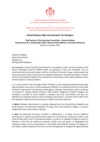
Sovereign Order of Malta
7 Oct 2021 ... It is a top priority for the Sovereign Order of Malta to assist displaced populations by being fully involved in crisis areas. In these endeavours UNHCR is an important partner for the Order of Malta...... -
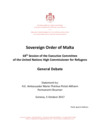
Statement of Sovereign Order of Malta
4 Oct 2017 ... ORGANIZATIONS IN GENEVA Sovereign Order of Malta 68 th Session of the Executive Committee ... The Sovereign Order of Malta shares UNHCR’s view that the New York Declaration, the Comprehensive ...... -
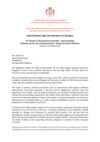
Sovereign Order of Malta
13 Oct 2022 ... Engaged in many of the countries referred to, the Sovereign Order of Malta shares his concerns on ... Integration and other services are being offered in Lithuania and Slovakia. The Order of Malta is ...... -

Statement of Order of Malta
10 Oct 2019 ... The Sovereign Order of Malta, through its global humanitarian action, aims at addressing the ... The Order of Malta continues its response to the different and complex situations of displacement in ...... -

Statement of the Sovereign Order of Malta
5 Oct 2016 ... ORGANISATIONS IN GENEVA Sovereign Order of Malta 67 th Session of the Executive Committee ... High Commissioner, Excellencies, Distinguished Delegates, On behalf of the Sovereign Order of Malta ...... -
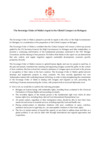
The Sovereign Order of Malta's input to the Global Compact on Refugees
11 Dec 2017 ... Global Compact on Refugees The Sovereign Order of Malta is pleased to provide its inputs to the ... The Sovereign Order of Malta is confident that the Global Compact will foresee a follow-up process ...... -
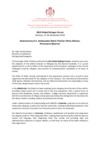
Statement from the Sovereign Order of Malta
17 Dec 2019 ... High-Commissioner, Ministers, Excellencies, Distinguished Delegates, The Sovereign Order of Malta ... The Order of Malta actively participated in the preparatory process and is proud to have supported ...... -
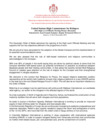
Statement of The Sovereign Order of Malta
15 Dec 2021 ... Geneva, 14 &15 December 2021 The Sovereign Order of Malta welcomes the opening of the High-Level ... next Global Refugee Forum in 2023. This will also be an important milestone to the Order of Malta. ...... -
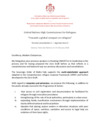
Statement of the Sovereign Order of Malta to the first formal consultation, agenda item two
14 Feb 2018 ... The Sovereign Order of Malta fully supports the multi-stakeholder approach adopted in the ... in paragraph 29 of the Zero Draft, the Order of Malta would welcome a wider definition of the ......
